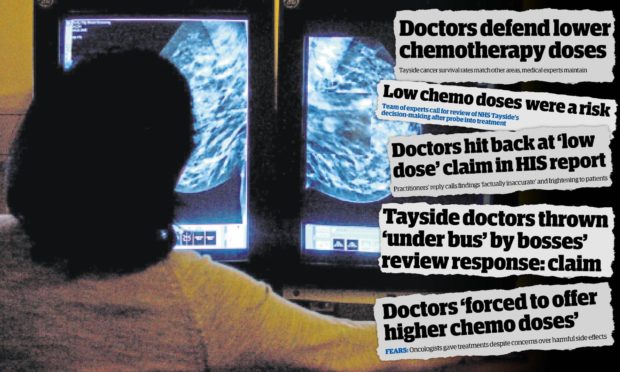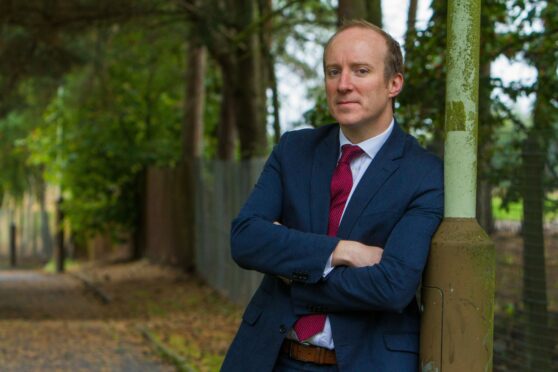NHS Tayside is at the centre of fresh cover-up allegations after altering a controversial report into its breast cancer scandal.
The health board quietly removed a review of services by the Royal College of Physicians (RCP) London from its website before re-uploading it with the names of the authors excised.
The respected RCP is a professional body which aims to drive improvements in healthcare.
The review looked into the case notes of patients unknowingly given lower doses of chemotherapy drugs between 2016 and 2019.
The Courier has learned it was pulled by NHS Tayside on the same day a complaint was made to RCP London about an alleged conflict of interest on the investigating panel.
Bosses said it is standard practice for names to be removed prior to publication – because of General Data Protection Regulation (GDPR) rules – and that the earlier version of the review was posted “in error”.
But the health board has been accused by a local MSP of mounting a “cover-up”.
‘Conflict of interest’
It comes after an initial RCP London review had already been scrapped in 2019 when it emerged a team member was previously involved in an internal investigation into the treatment offered by NHS Tayside.
We can now reveal concerns have also been raised about an alleged conflict of interest involving one of the authors of the most recent report.
It relates to oncologist Dr Karen McAdam, who is listed on her ResearchGate page as a “top co-author” of Dr David Cameron.
Dr Cameron was involved in a hotly-disputed risk assessment ordered by the Scottish Government in 2019.
It claimed the treatment offered in Tayside likely resulted in a 1-2% increased risk of patients having their cancer return but offered little evidence to back it up.
The Courier previously reported how Dr Cameron described the claim in private correspondence as “flawed, probably, but the best that could be done really”.
Accusations of a ‘stitch-up’
North East region MSP Michael Marra said: “For one commissioned report to fall foul of conflict of interest in this crisis was hugely regrettable. For the replacement report to fail the same test is appalling.
“But what is much, much worse is an attempted cover-up by those in power when women and their families are seeking the truth about critical care.
“The chief executive of NHS Tayside must reveal immediately who removed this vital information and, crucially, who ordered the cover-up.
“The decision to mount this cover-up is a betrayal of all of the women of Tayside and adds significant weight to the accusations of a stitch-up by authorities.”
Nicola Sturgeon and health secretary Humza Yousaf have referenced the RCP London report while facing calls for an inquiry into the scandal.
Mr Marra said: “This report was the first minister’s defence last week. Nicola Sturgeon cited it at length in defence of her Government’s approach.
“That authorities were already mounting a cover-up is utterly scandalous. The case for an independent inquiry is now irresistible.”
NHS Tayside rejects claims
An NHS Tayside spokeswoman said: “Under GDPR legislation, it is standard practice to redact the personal data of report authors in the same way that potentially identifiable patient data is redacted.
“Reviewer names were included in error in the first version of the redacted report which was published on our website.
“As soon as we were made aware of this error, it was corrected and the report was republished on the NHS Tayside website.”
We reported previously that the RCP London review appears to contradict earlier, more positive findings by NHS Tayside, the General Medical Council and the Scottish Government’s former senior medical officer for oncology, Dr David Dunlop.
The paper also references guidance by the National Institute for Health and Care Excellence (Nice) on “standard” doses for the chemotherapy drugs involved in the scandal.
Its guidelines are evidence-based recommendations for healthcare in England, Wales and Northern Ireland. They are taken note of in Scotland.
But RCP London did not respond when asked where this information could be found or why the section cited in the report makes no mention of such guidelines.
Concerns over claims in report
Ms Sturgeon claimed during first minister’s questions on Thursday that the findings of the review “aligned” with previous reports, including one carried out by Healthcare Improvement Scotland (HIS).
However, that does not appear to be the case.
In one example, the report states: “Previous reviews, including the Health Improvement Scotland (HIS) review, recommended that NHS Tayside prescribed/offered standard doses of adjuvant chemotherapy, and the review team noted that the Health Board accepted those recommendations.”
But a spokesman for HIS said: “Our report and recommendations made no comment on what chemotherapy dosages were appropriate for individual patients nor on the practices of any individual clinicians.”
RCP London did not respond when asked to explain these inconsistencies.




Conversation